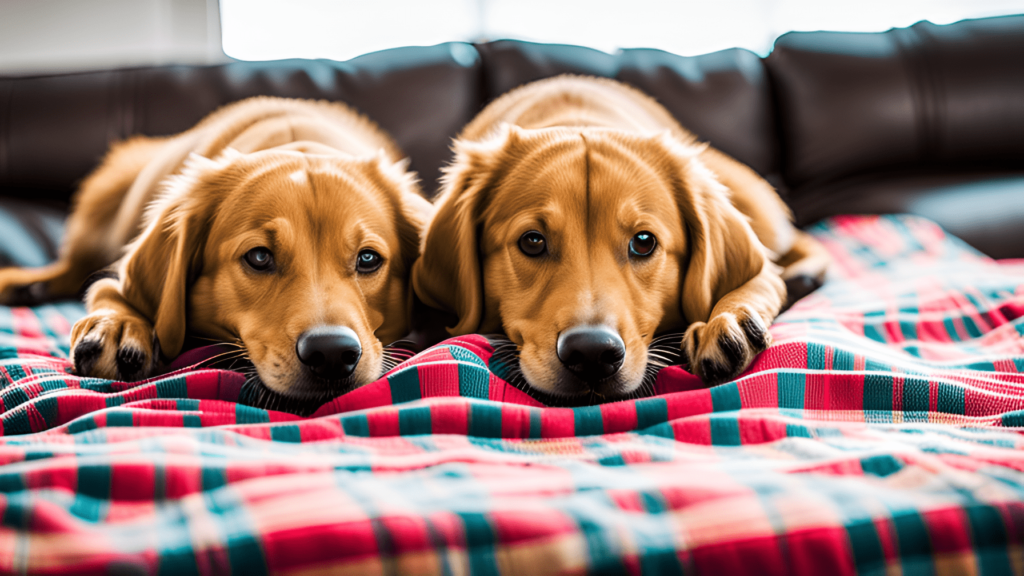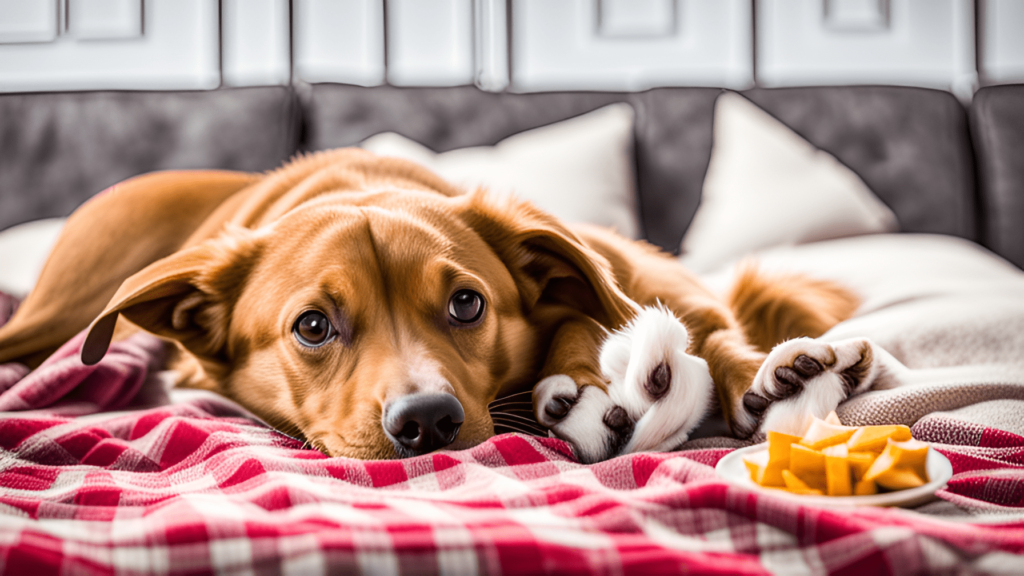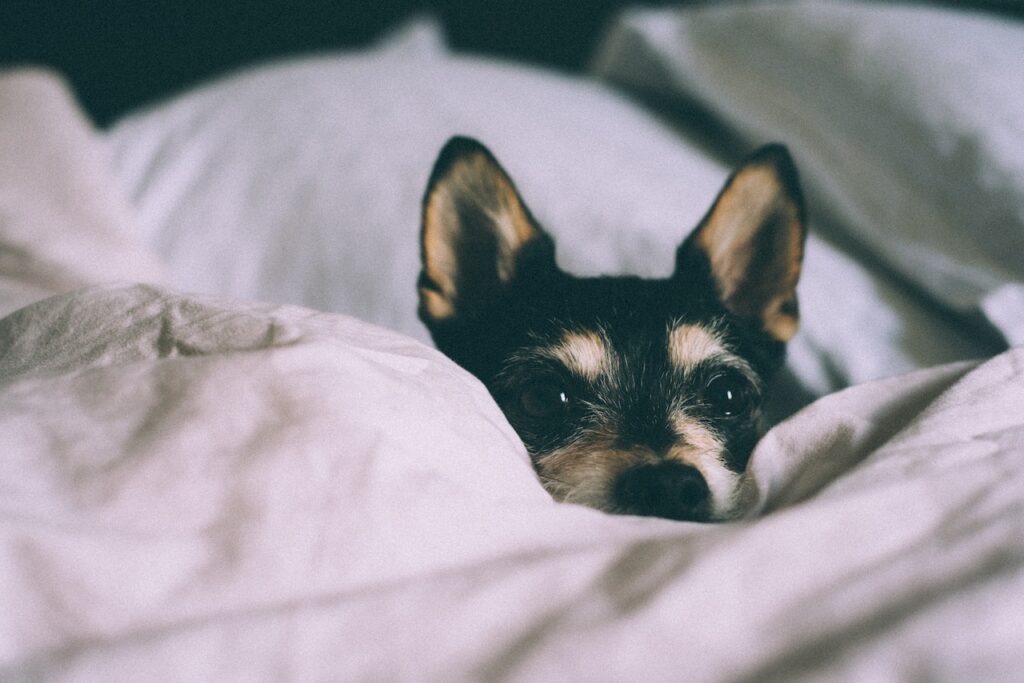If you have a furry friend at home, you might have noticed them nibbling on blankets sometimes. It’s something many dogs do, but have you ever wondered why? In this article, we’ll explore five reasons why dogs nibble on blankets and give you tips on how to stop your dog from doing it.
Reasons Why Dogs Chew on Blankets

1. Teething Troubles
Just like human babies, puppies go through a teething phase. When their new teeth are coming in, their gums can feel uncomfortable and itchy. Nibbling on blankets can help massage their gums and ease the discomfort. It also helps their loose teeth come out.
2. Curiosity and Exploration
Dogs are naturally curious creatures. Nibbling on blankets can be a way for them to explore and investigate their surroundings. The different textures, scents, and tastes of blankets can catch their interest and make them want to chew.
3. Anxiety and Stress
Dogs are sensitive beings, and when they feel anxious or stressed, they may turn to nibbling on blankets as a way to comfort themselves. It gives them a sense of security during challenging situations like thunderstorms, separation anxiety, or changes in their routine.
4. Boredom and Lack of Stimulation
Dogs are intelligent animals that need mental and physical stimulation to stay happy. When they are bored or not properly entertained, they may resort to nibbling on blankets as a way to pass the time. It helps them release energy and fight off boredom.
5. Seeking Attention
Dogs are social animals and crave attention from their human companions. Sometimes, they chew on blankets to get your attention. If they notice that you respond to their nibbling, even if it’s to scold them, they might think it’s an effective way to get noticed.
How to Stop Your Dog from Chewing on Blankets

Now that we know why dogs chew on blankets, let’s discuss some effective strategies to help you stop this behavior:
1. Provide Chew Toys
Give your dog appropriate chew toys to redirect their nibbling behavior. Choose toys specifically made for dogs, as they are safe and durable for nibbling.
When you see your dog starting to nibble on a blanket, gently guide their attention towards the chew toy. Praise and reward them when they engage with the toy instead.
2. Create a Stimulating Environment
Dogs need mental and physical stimulation to stay happy. Make sure your dog gets regular exercise through walks, playtime, and interactive toys.
You can also provide puzzle toys or treat-dispensing toys that require your dog to work for their treats. A well-stimulated dog is less likely to nibble on blankets out of boredom.
3. Establish a Safe Space
Set up a designated area in your home where your dog feels safe and comfortable. Use a crate or a cozy dog bed with familiar blankets and toys.
This safe space can be a retreat for your dog during stressful or anxious times. Give plenty of positive reinforcement when your dog voluntarily spends time in their safe space.
4. Teach the “Leave It” Command
Train your dog to respond to the “leave it” command to prevent them from chewing on blankets. Start by holding a treat in your closed fist and offering it to your dog. When they try to chew or show interest in your hand, firmly say “leave it” and close your hand.
Once your dog stops trying to get the treat, reward them with a different treat or praise. Practice this command consistently and gradually use it when your dog is likely to chew on blankets.
5. Address Underlying Anxiety or Stress
If your dog continues to chew on blankets despite your efforts, it’s important to address any underlying anxiety or stress they may be experiencing. Consult with a veterinarian or animal behaviorist who can assess your dog’s specific needs and recommend appropriate solutions.
They may suggest behavior modification techniques, training exercises, or, in some cases, medication to help manage your dog’s anxiety.
FAQs about Dogs Chewing on Blankets
Q: Is it bad if my dog nibbles on blankets?
A: In most cases, occasional chewing on blankets is not harmful. However, excessive chewing or swallowing of blanket fibers can cause digestive problems or blockages. Keep an eye on your dog’s behavior and seek veterinary advice if you notice any signs of distress or unusual chewing habits.
Q: How can I tell if my dog is nibbling due to anxiety?
A: Dogs may show signs of anxiety such as restlessness, excessive panting, pacing, whining, or destructive behavior. If your dog’s chewing is accompanied by these behaviors or occurs during stressful situations, it could be a sign of anxiety.
Q: Can I use bitter sprays to stop my dog from nibbling on blankets?
A: Bitter sprays can be effective deterrents as they have an unpleasant taste and smell. However, choose a spray that is safe for dogs and consult with your veterinarian before using any products on your dog’s belongings.
Q: Is it okay to scold my dog for chewing on blankets?
A: Scolding or punishing your dog for chewing on blankets may create a negative association and increase their anxiety or stress levels. Instead, focus on positive reinforcement by redirecting their attention to appropriate chew toys and rewarding good behavior.
Q: How long does it take to train a dog to stop nibbling on blankets?
A: Every dog is unique, so the training duration may vary. Consistency, patience, and positive reinforcement are key. Some dogs may respond quickly to training, while others may take more time and practice. Be persistent and celebrate small victories along the way.
Conclusion
Dogs nibbling on blankets is a common behavior with different underlying reasons. By understanding these reasons and following the strategies we’ve discussed, you can effectively redirect your dog’s behavior and prevent them from damaging blankets.
Remember to provide appropriate chew toys, create a stimulating environment, and address any underlying anxiety or stress. With patience, consistency, and love, you can help your furry friend overcome this habit and lead a happy, healthy life.


